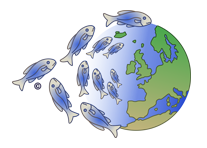

Gymnangium montagui is a hydroid that develops in erect feather-like colonies from 8 to 10 cm high and covering areas of about 10 cm2. Colonies bud from a basal stolon and grow in the same direction, parallel to each other. The outline of each plume is regular up to the 4/5th of their height, then it ends in an angular way. The main stem, called hydrocaulus, has from 100 to 300 alternate branches in two rows which are parallel and slightly curved. The tiny polyps, invisible to the eyes, are aligned on the curved side of the branches. Their tentacles open out on both sides of the inter-branches. The Indian feathers hydroid lives in moderatly current-swept areas between 10 and 40 meters deep, generally attached to the horizontal side of rocks, and protected by overhangs in shallow waters.
Gymnangium montagui is reported in the North-West Atlantic Ocean and is rare in the English Channel.
Source : World Register of Marine Species
Biota (Superdomain)
Animalia (Kingdom)
Cnidaria (Phylum)
Medusozoa (Subphylum)
Hydrozoa (Class)
Hydroidolina (Subclass)
Leptothecata (Order)
Plumularioidea (Superfamily)
Aglaopheniidae (Family)
Gymnangium (Genus)
Gymnangium montagui (Species)
Budding : asexual reproduction forming a new individual.
Basal stolon : linear base linking colonies together and from where the colonies bud and grow..
Hydrocaulus : main stem of a hydroid colony.
Polyp : individual of a colony.
Text : Wilfried Bay-Nouailhat, Anne Bay-Nouailhat © 2007 - 2026.
Photos : ©
Wilfried Bay-Nouailhat. Published with his kind permission.
Websites and reference works : Consult bibliography
Image satellite: © Esri, DigitalGlobe, GeoEye, Earthstar Geographics, CNES/Airbus DS, USDA, USGS, AeroGRID, IGN, and the GIS User Community.
Données de distribution : Gymnangium montagui (Billard, 1912) in GBIF Secretariat (2019). GBIF Backbone Taxonomy. Checklist dataset https://doi.org/10.15468/39omei accessed via GBIF.org on 2026-01-05.
Source : World Register of Marine Species
Biota (Superdomain)
Animalia (Kingdom)
Cnidaria (Phylum)
Medusozoa (Subphylum)
Hydrozoa (Class)
Hydroidolina (Subclass)
Leptothecata (Order)
Plumularioidea (Superfamily)
Aglaopheniidae (Family)
Gymnangium (Genus)
Gymnangium montagui (Species)
Budding : asexual reproduction forming a new individual.
Basal stolon : linear base linking colonies together and from where the colonies bud and grow..
Hydrocaulus : main stem of a hydroid colony.
Polyp : individual of a colony.
Text : Wilfried Bay-Nouailhat, Anne Bay-Nouailhat © 2007 - 2026.
Photos : ©
Wilfried Bay-Nouailhat. Published with his kind permission.
Websites and reference works : Consult bibliography
Bay-Nouailhat W., Bay-Nouailhat A., september 2007, Description of Gymnangium montagui, [On line] https://www.european-marine-life.org/05/gymnangium-montagui.php, consulted on 2026 January 05.
Authors

Plongeur - Naturaliste
Photographe Sous-Marin

Chargée d’études en environnement marin
Plongeuse professionnelle - Naturaliste
© Mer et littoral 2004-2026 - All rights reserved
The texts and images on this website are not free of rights and cannot be copied and/or used without the agreement of their respective authors.